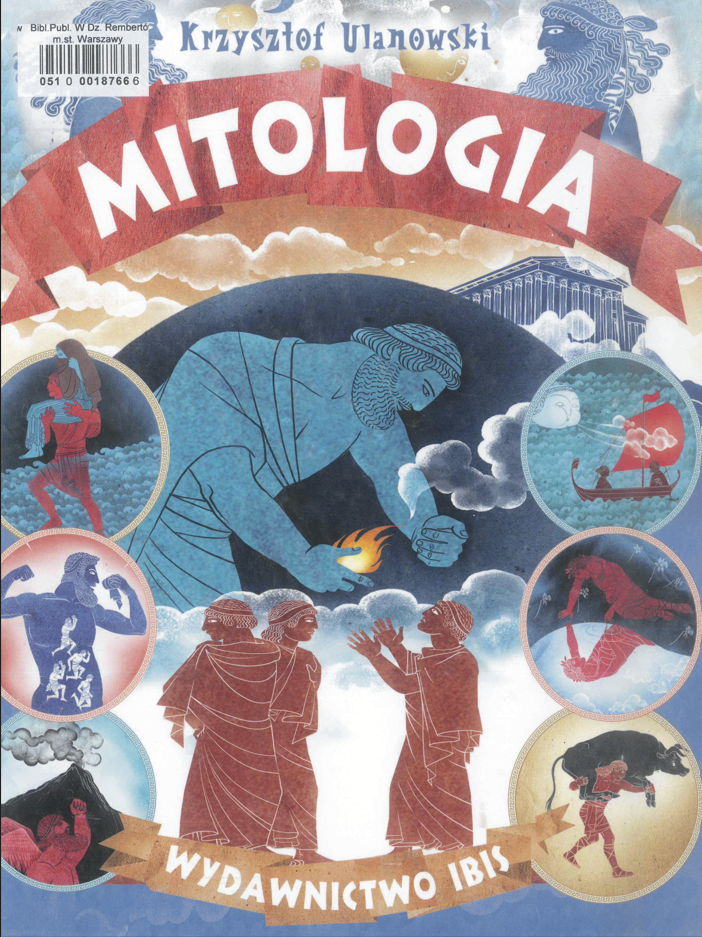Title of the work
Country of the First Edition
Country/countries of popularity
Original Language
First Edition Date
First Edition Details
Krzysztof Ulanowski, Mitologia, ill. Maria Wróbel. Poznań: Wydawnictwo IBIS, 2011, 56 pp.
ISBN
Genre
Anthology of myths*
Target Audience
Children
Cover

Courtesy of the publisher.
Author of the Entry:
Summary: Sebastian Mirecki, University of Warsaw, smirecki@student.uw.edu.pl
Analysis: Hanna Paulouskaya, University of Warsaw, hannapa@al.uw.edu.pl
Peer-reviewer of the Entry:
Elżbieta Olechowska, University of Warsaw, elzbieta.olechowska@gmail.com
Marta Pszczolińska, University of Warsaw, m.pszczolinska@al.uwedu.pl

Photograph courtesy of the Author.
Krzysztof Ulanowski
, b. 1966
(Author)
A lawyer by education, earns his life as a journalist, translator of English texts, and author for young readers. Contributes to local and national press, as well as to periodicals specializing in mountain tourism. Interested also in animal rights, travel and jogging. Vegan and marathon runner.
Bio based on the material kindly provided by the Author.
Bio prepared by Sebastian Mirecki, University of Warsaw, smirecki@student.uw.edu.pl
Summary
Based on: Katarzyna Marciniak, Elżbieta Olechowska, Joanna Kłos, Michał Kucharski (eds.), Polish Literature for Children & Young Adults Inspired by Classical Antiquity: A Catalogue, Faculty of “Artes Liberales”, Warsaw: University of Warsaw, 2013, 444 pp.
A book for children and young readers. It contains the most popular myths and short stories about Greek gods, heroes and humans. Clarity of narration and lack of graphic description of violence make the book appropriate for young readers.
The book includes eight chapters and a conclusion:
- Wars of the Gods
- Gods and Men
- The Goddess in Love
- About a Man Who Loved Himself
- The Kidnapping of Kore
- The Flight of Icarus
- The Thread of Ariadne
- The Quest for the Golden Fleece
Analysis
The book is written in an easy and clear way. It begins as a typical fairy tale: “Dawno, dawno temu, za rozległymi lasami…” (Once upon a time, beyond vast forests…, p. 5), and refers to the fairy-tale template, like the phrase (“żyli potem długo i szczęśliwie” [they lived happily ever after], p. 18). It contains emotional descriptions and exclamations, as well as uses diminutives typical for books for children (such as, “synek” [sonny], p. 6; “serduszka” [little hearts], p. 23; “tatusiu” [daddy], p. 34, etc.). Ulanowski adds imaginative details and redundant words, which makes the text more vivid (for example, after the appearance of Earth and Sky, “[n]a niebie nieśmiało zaświeciło słońce” [the sun timidly began to shine in the sky], p. 5; or, the author uses the adverb “very” in excess, pp. 5, 6, 9, 12, 14, 15, etc.). The author tends to give positive descriptions to all creatures, such as the first generation of gods and titans were “dzielni i silni” (brave and strong, p. 5). For Gaia they were just kids whom she has pitied (“Gaja pożałowała swoich uwięzionych pod ziemią dzieci” [Gaia pitied her children trapped underground], p. 5) and loved (“Były to przecież jej ukochane dzieci!” [After all, they were her beloved children!], p. 9). The book includes a minimum of cruel details or sexual references (cf. killing of Uranus, p. 6, or the birth of Minotaur, p. 30).
At the same time, the author does not avoid difficult words and phrases, sometimes providing an explanation for them. For example, for “blue [river]” he uses the archaic “modry” [intensive blue], although the more commonly used words “niebieski” or “błękitny” might be used here as well (p. 5); or to say that Pygmalion was very happy to see Galatea come to life, the phrase “nie posiadać się ze szczęścia” is used (p. 18), which is somewhat dated Polish. Finally, describing the Chaos that was in the beginning, Ulanowski adds an explanation – “czyli wielki, niewyobrażalnie ogromny bałagan” (that is a big, unimaginably huge mess, p. 5).
The author especially appeals to the Polish reader often using an inclusive “we”, “us”, “our” (e.g., “naszą Polskę” [our Poland] (p. 5), “nasze Tatry” [our Tatras] (p.15)). “U nas, w Polsce” [here in Poland] (p. 9), one can find the mace of Heracles, which is a huge rock with such a name*). He often emphasises “today’s” state of knowledge or human achievement (p. 10–12, 15, 24, 33, etc.). Ulanowski also stresses that he is writing for schoolchildren, referring to their knowledge of different school subjects (e.g., geography, p. 10) or just school knowledge (p. 24, 29, etc.).
The book often contains moral messages and promotes values (for example: “Tak, tak, nawet ta dobra Afrodyta potrafiła być aż tak złośliwa. A wszystko przez tak niegodną bogów cechę jak zazdrość” [Yes, yes, even the good Aphrodite could be that malicious. And all this because of jealousy, such an unworthy trait for the gods], p. 19; “I ku przestrodze innym. Bo dobrze jest kochać, ale bardzo źle jest kochać wyłącznie siebie” [And as a warning to others. For it is good to love, but it is very bad to love only yourself], p. 24).
Unfortunately, there are some spelling errors in the book (e.g., “Almateja” for “Amalteja” [Amalthea], p. 6; Polish “already” instead of “yet”, p. 10**).
The book contains beautiful illustrations on every page painted in the style of Greek vases. The colours used the most are shades of blue, red, and yellow, which makes the design of the book especially attractive.
* “Tak naprawdę jest to zwykła, wapienna skała, ale dzięki temu, że ma podłużny kształt i rozszerza się ku górze, nazwano ją właśnie ‘maczugą Heraklesa’” [In fact, it is an ordinary limestone rock, but due to its long shape that widens upwards, it has been called “the mace of Heracles”], p. 9.
** “Nie umieli już budować tak doskonałych domostw (…), jakie potrafimy wytwarzać dziś” [They did not already know how to build such perfect houses (…) as we are able to make today], pp. 10–12.


